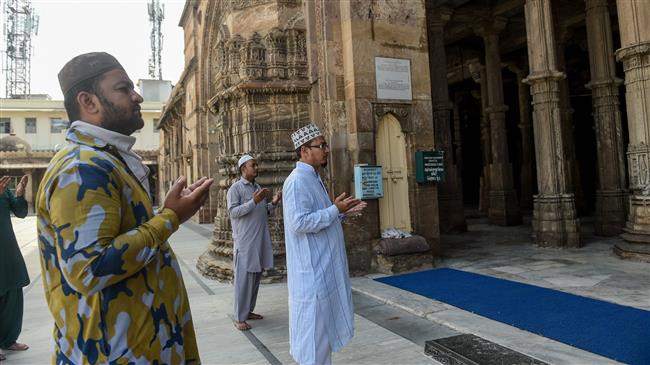
Muslims offer Friday Prayers as they stand maintaining social distancing at the ancient Shahi Jama Masjid during a lockdown as a preventive measure against the COVID-19 coronavirus, in Ahmedabad on March 27, 2020. (Photo by AFP)
The coronavirus outbreak has sparked a spree of anti-Muslim attacks across India, with the health ministry of the Hindu nationalist government of Narendra Modi claiming that Muslims are spreading the virus.
According to The New York Times, Muslim youth who were distributing food to the poor have been assaulted with cricket bats.
Other Muslims have been beaten up, nearly lynched, run out of their neighborhoods or attacked in mosques, branded as virus spreaders, the paper reported.
Sikh temples in Punjab State, it said, are urging people not to purchase milk from Muslim dairy farmers because it is allegedly infected with the coronavirus.
Hateful messages have also grown online. According to the Times, fake videos have popped up calling on Muslims not to take protective measures, including wearing masks and practicing social distancing, and urging them not to worry about the virus at all as if they aimed to let Muslims get infected with the virus.
The paper said the rising anti-Muslim attacks came after the government claimed that more than a third of the country’s 8,000-plus coronavirus cases were connected to Muslims.
Mohammed Haider, who runs a milk stall, one of the few businesses allowed to remain open under India’s coronavirus restrictions, said, Fear is staring at us, from everywhere.’’
People need only a small reason to beat us or to lynch us,’’ he said. Because of corona.’’
Muslim leaders expressed concern over the new wave of hatred, recounting a February attack by Hindu mobs on Muslims in a working-class neighborhood in Delhi that claimed the lives of dozens of people in the presence of police.
The government should not have played the blame game, Khalid Rasheed, the chairman of Islamic Center of India, said. If you present the cases based on somebody’s religion in your media briefings,’’ he said, it creates a big divide.
Coronavirus may die, he added, but the virus of communal disharmony will be hard to kill when this is over.
According to the Times, some Hindu nationalist politicians and their supporters have seized on the situation, eagerly piling on the anti-Muslim sentiments that have been building in recent years under Prime Minister Modi’s government.
India’s health ministry confirmed that blaming Muslim for the virus outbreak is based on false reports, it added.
Certain communities and areas are being labeled purely based on false reports, the health ministry said in a statement last week, adding There is an urgent need to counter such prejudices.
Modi’s government is accused of encouraging religious intolerance and seeking to transform India into a Hindu state.
Last December, India’s parliament passed a new citizenship law, which is seen as discriminatory toward Muslims. Under the law, migrants from Bangladesh, Pakistan, and Afghanistan will be allowed to claim Indian citizenship - but not if they are Muslims.
The act has led to deadly protests. Amid the bloody anti-Muslim violence, Trump paid an official visit to India in February.
Despite promises made by US administration officials prior to the visit that the US president would raise the issue of religious freedom in his conversations with Modi, Trump said he was satisfied that India’s Modi was working really hard to establish religious freedom.
As part of the government’s discriminatory policies against Muslims last year, New Delhi also announced in August that it was removing the special status of the disputed Muslim-majority region of Kashmir.
Earlier this month, India introduced a new law that would make its citizens eligible to become permanent residents of the Indian-administered Kashmir, raising fears of demographic change in the Himalayan region.
Kashmir is generally considered a disputed territory. It has been split between India and Pakistan since their partition in 1947. The countries have fought three wars over the territory.
Since Modi’s Hindu nationalist Bharatiya Janata Party came to power in 2014, cow vigilantism by pro-Hindu groups has also surged in India although most of the country’s 29 states have banned the killing of cows, which is considered by Hindus as sacred, for meat.
Human Rights Watch and activist groups have condemned rising brutal attacks in the country by self-appointed cow protectors against Muslims and lower castes over rumors that they trade or kill cows for beef.
The selling of beef is banned in several Indian states and its consumption is now permitted in only eight of the country’s 29 states and territories.
Many Hindus regard the cow as sacred, but India’s Muslim minority engages in the trade of cattle for slaughter and consumption, chiefly of buffalo meat, as well as dairy purposes.
SOURCE: PRESS TV
LINK: https://www.ansarpress.com/english/15816
TAGS:






























 online news tv
online news tv




